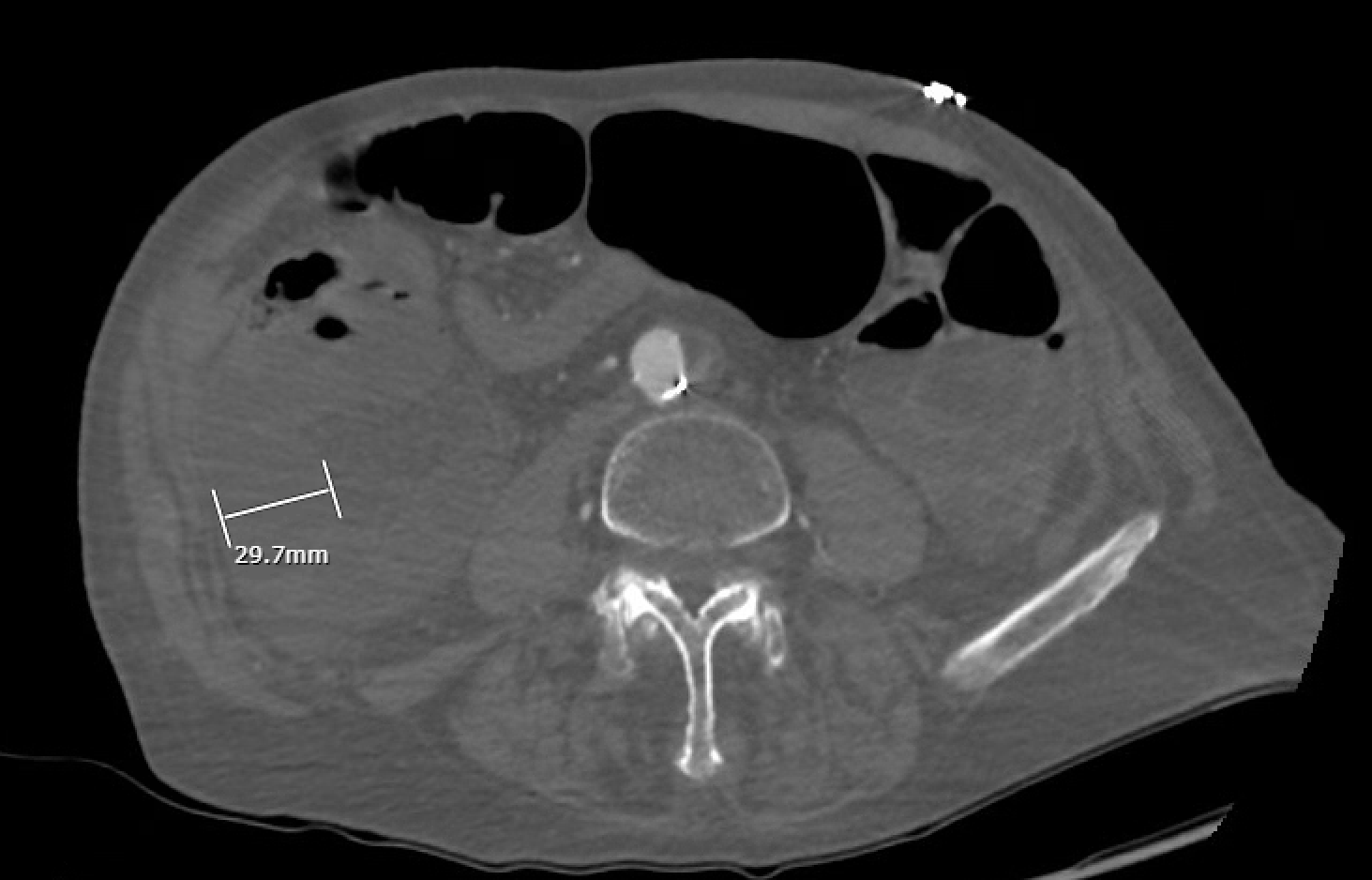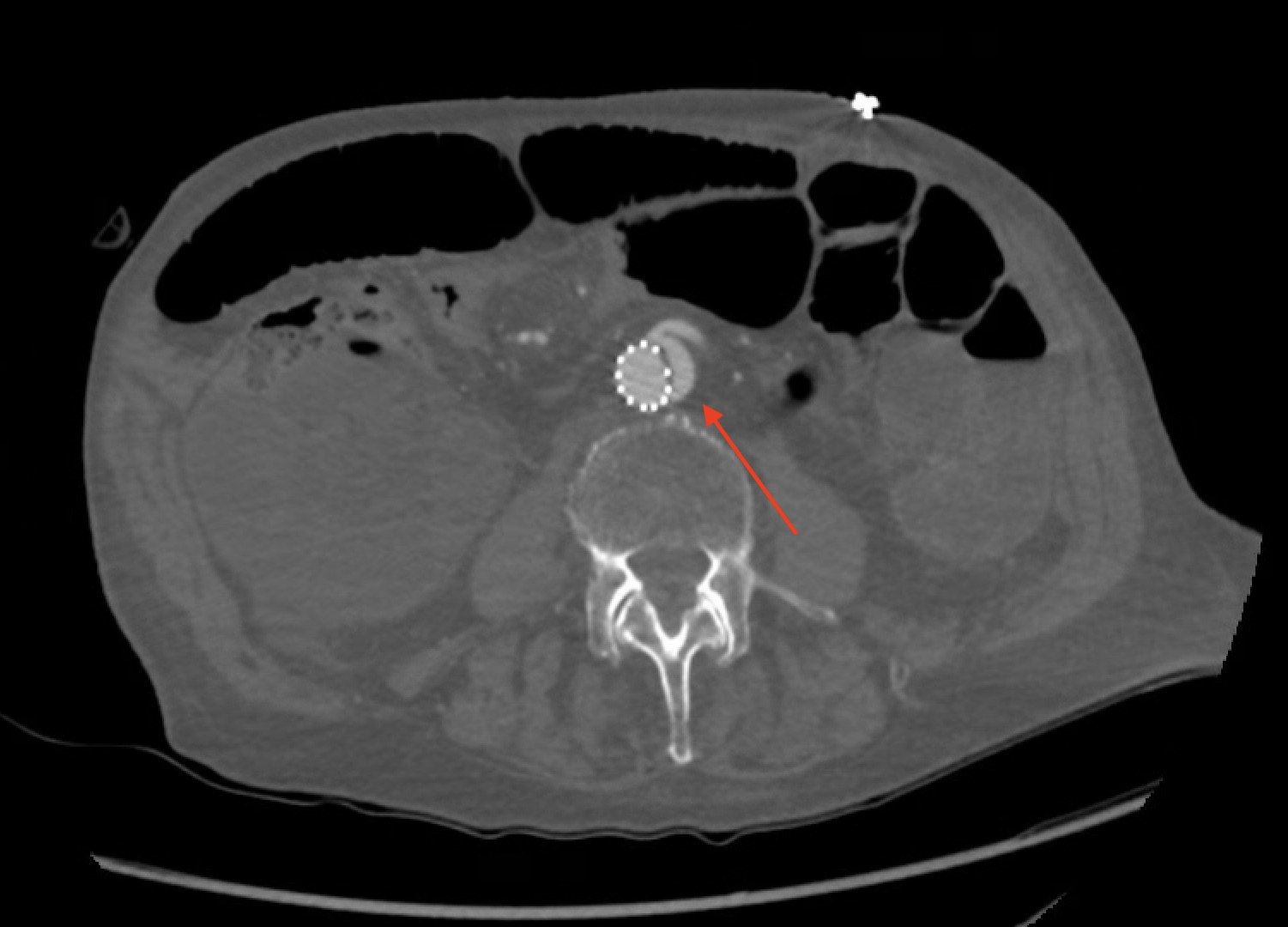Tuesday Poster Session
Category: Small Intestine
P6234 - Chronic Mesenteric Ischemia Due to Endoleak Causing Internal Hernia and Small Bowel Obstruction Following Thoracic Endovascular Aorta Repair (TEVAR)
Tuesday, October 28, 2025
10:30 AM - 4:00 PM PDT
Location: Exhibit Hall

McKenna Andrews, MD
East Tennessee State University
Kingsport, TN
Presenting Author(s)
McKenna Andrews, MD1, Ashley B. Sundin, DO2, Sean Moore, MD2, Angel Miguel. Green, DO3, Jonathan Jarman, MD4, David W. Berry, DO5, Venkata Pulivarthi, MD5
1East Tennessee State University, Kingsport, TN; 2East Tennessee State University Quillen College of Medicine, Johnson City, TN; 3East Tennessee State University Internal Medicine, Johnson CIty, TN; 4ETSU Internal Medicine, Johnson City, TN; 5East Tennessee State University, Johnson City, TN
Introduction: Chronic mesenteric ischemia (CMI) is a rare but serious condition resulting from prolonged mesenteric hypoperfusion, often related to atherosclerosis or prior vascular interventions. Endoleaks following thoracic endovascular aortic repair (TEVAR) can lead to chronic mesenteric ischemia over time, potentially causing severe gastrointestinal complications.
Case Description/
Methods: We present the case of an 86-year-old male with a history of type B thoracic aortic dissection treated with TEVAR and left renal artery stenting, who presented one year later with new-onset epigastric pain and signs of bowel obstruction. A chronic endoleak had been identified six months post-TEVAR (Image 1). Computed tomography imaging (Image 2) revealed a chronic, stable endoleak and findings suggestive of an internal hernia with partial small bowel obstruction. Exploratory laparotomy confirmed a closed-loop obstruction secondary to an internal hernia through a peritoneal defect, necessitating small bowel resection and re-anastomosis.
Remarkably, the patient did not exhibit typical metabolic features of acute mesenteric ischemia, such as lactic acidosis, and remained hemodynamically stable, consistent with a chronic ischemic process. His postoperative course was complicated by transient bradyarrhythmia and melena, though no active bleeding source was identified on endoscopy or imaging. He was discharged to acute rehabilitation with stable hemoglobin but unfortunately passed away during his rehab stay.
Discussion: This case illustrates an atypical and delayed gastrointestinal complication of TEVAR-associated endoleak. Chronic mesenteric ischemia may develop insidiously, particularly in elderly patients with persistent endoleaks, and can progress to serious complications such as internal herniation and small bowel obstruction—even in the absence of acute ischemic markers. Stable endoleaks can obscure evolving ischemic injury, emphasizing the need for long-term vigilance and surveillance in post-TEVAR patients. Clinicians should maintain a high index of suspicion for chronic mesenteric ischemia and its complications in patients with a history of aortic interventions. Early recognition and multidisciplinary management are crucial to preventing life-threatening outcomes.

Figure: Image 1. Axial contrast-enhanced CT images of the abdomen demonstrate aortic endograft placement in the descending thoracic aorta. Evidence of Endo leak involving the descending thoracic aorta stent graft.

Figure: Image 2. Axial CT image of the abdomen demonstrating dilated small bowel loops, suggestive of small bowel obstruction. Notably, there is a focally thickened segment of bowel wall, measuring 29.7 mm, raising concern for underlying severe ischemic/inflammatory change contributing to a partial obstruction.
Disclosures:
McKenna Andrews indicated no relevant financial relationships.
Ashley Sundin indicated no relevant financial relationships.
Sean Moore indicated no relevant financial relationships.
Angel Green indicated no relevant financial relationships.
Jonathan Jarman indicated no relevant financial relationships.
David Berry indicated no relevant financial relationships.
Venkata Pulivarthi indicated no relevant financial relationships.
McKenna Andrews, MD1, Ashley B. Sundin, DO2, Sean Moore, MD2, Angel Miguel. Green, DO3, Jonathan Jarman, MD4, David W. Berry, DO5, Venkata Pulivarthi, MD5. P6234 - Chronic Mesenteric Ischemia Due to Endoleak Causing Internal Hernia and Small Bowel Obstruction Following Thoracic Endovascular Aorta Repair (TEVAR), ACG 2025 Annual Scientific Meeting Abstracts. Phoenix, AZ: American College of Gastroenterology.
1East Tennessee State University, Kingsport, TN; 2East Tennessee State University Quillen College of Medicine, Johnson City, TN; 3East Tennessee State University Internal Medicine, Johnson CIty, TN; 4ETSU Internal Medicine, Johnson City, TN; 5East Tennessee State University, Johnson City, TN
Introduction: Chronic mesenteric ischemia (CMI) is a rare but serious condition resulting from prolonged mesenteric hypoperfusion, often related to atherosclerosis or prior vascular interventions. Endoleaks following thoracic endovascular aortic repair (TEVAR) can lead to chronic mesenteric ischemia over time, potentially causing severe gastrointestinal complications.
Case Description/
Methods: We present the case of an 86-year-old male with a history of type B thoracic aortic dissection treated with TEVAR and left renal artery stenting, who presented one year later with new-onset epigastric pain and signs of bowel obstruction. A chronic endoleak had been identified six months post-TEVAR (Image 1). Computed tomography imaging (Image 2) revealed a chronic, stable endoleak and findings suggestive of an internal hernia with partial small bowel obstruction. Exploratory laparotomy confirmed a closed-loop obstruction secondary to an internal hernia through a peritoneal defect, necessitating small bowel resection and re-anastomosis.
Remarkably, the patient did not exhibit typical metabolic features of acute mesenteric ischemia, such as lactic acidosis, and remained hemodynamically stable, consistent with a chronic ischemic process. His postoperative course was complicated by transient bradyarrhythmia and melena, though no active bleeding source was identified on endoscopy or imaging. He was discharged to acute rehabilitation with stable hemoglobin but unfortunately passed away during his rehab stay.
Discussion: This case illustrates an atypical and delayed gastrointestinal complication of TEVAR-associated endoleak. Chronic mesenteric ischemia may develop insidiously, particularly in elderly patients with persistent endoleaks, and can progress to serious complications such as internal herniation and small bowel obstruction—even in the absence of acute ischemic markers. Stable endoleaks can obscure evolving ischemic injury, emphasizing the need for long-term vigilance and surveillance in post-TEVAR patients. Clinicians should maintain a high index of suspicion for chronic mesenteric ischemia and its complications in patients with a history of aortic interventions. Early recognition and multidisciplinary management are crucial to preventing life-threatening outcomes.

Figure: Image 1. Axial contrast-enhanced CT images of the abdomen demonstrate aortic endograft placement in the descending thoracic aorta. Evidence of Endo leak involving the descending thoracic aorta stent graft.

Figure: Image 2. Axial CT image of the abdomen demonstrating dilated small bowel loops, suggestive of small bowel obstruction. Notably, there is a focally thickened segment of bowel wall, measuring 29.7 mm, raising concern for underlying severe ischemic/inflammatory change contributing to a partial obstruction.
Disclosures:
McKenna Andrews indicated no relevant financial relationships.
Ashley Sundin indicated no relevant financial relationships.
Sean Moore indicated no relevant financial relationships.
Angel Green indicated no relevant financial relationships.
Jonathan Jarman indicated no relevant financial relationships.
David Berry indicated no relevant financial relationships.
Venkata Pulivarthi indicated no relevant financial relationships.
McKenna Andrews, MD1, Ashley B. Sundin, DO2, Sean Moore, MD2, Angel Miguel. Green, DO3, Jonathan Jarman, MD4, David W. Berry, DO5, Venkata Pulivarthi, MD5. P6234 - Chronic Mesenteric Ischemia Due to Endoleak Causing Internal Hernia and Small Bowel Obstruction Following Thoracic Endovascular Aorta Repair (TEVAR), ACG 2025 Annual Scientific Meeting Abstracts. Phoenix, AZ: American College of Gastroenterology.
